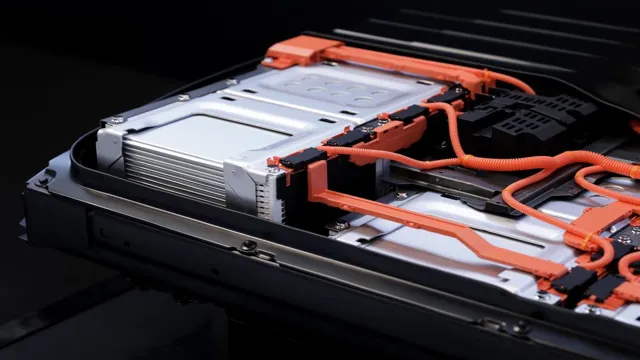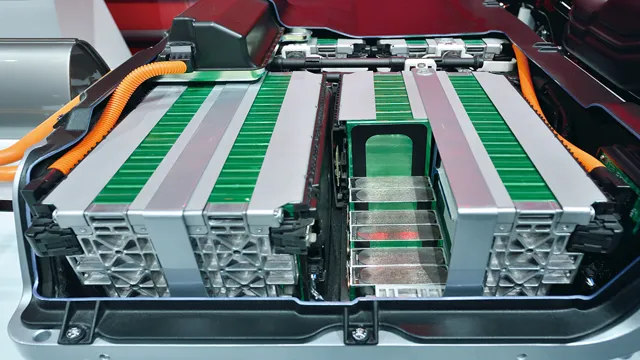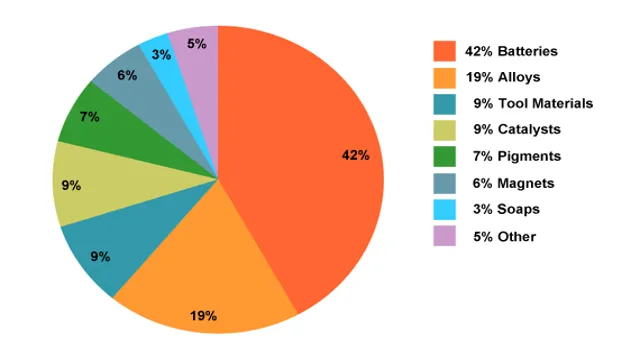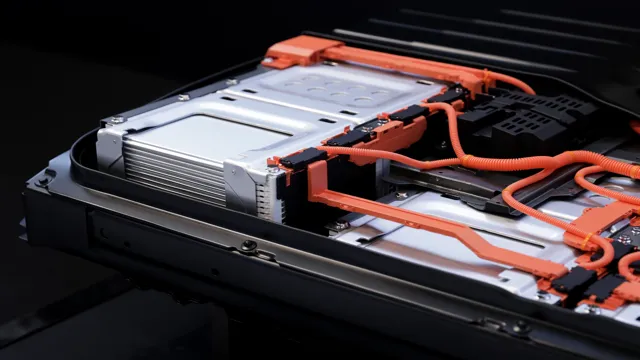The Truth About Cobalt in Electric Car Batteries: What You Need to Know
Electric vehicles have been gaining popularity in recent years due to their environmentally friendly nature and cost-effectiveness. However, these vehicles rely heavily on their batteries, making it crucial to have efficient and long-lasting ones. An essential component of electric vehicle batteries is cobalt, a metal used in the cathode of most lithium-ion batteries.
The demand for cobalt has increased significantly with the rise of electric vehicles, leading to questions about the sustainability of the supply chain. In this blog post, we will explore the connection between electric car batteries and cobalt, discussing the challenges it presents and what manufacturers are doing to reduce their reliance on the element.
The Importance of Cobalt in Electric Car Batteries
Yes, electric car batteries do contain cobalt! In fact, this mineral is a vital component of the lithium-ion batteries that are used to power electric cars. Cobalt plays a crucial role in ensuring that the battery can store and discharge energy efficiently, which is essential for the smooth functioning of the vehicle. However, there are concerns about the ethical and environmental implications of mining and using cobalt in electric car batteries, as many of the world’s cobalt mines have unsafe working conditions and use child labor.
As a result, many electric car manufacturers are looking for ways to reduce or eliminate their dependence on this mineral and find alternative materials that can provide similar performance benefits without the ethical concerns. While cobalt remains an important part of electric car batteries for now, it’s clear that the industry will need to find more sustainable solutions in the long term.
The Role of Cobalt in Battery Chemistry
Cobalt plays a crucial role in the chemistry of electric car batteries. In fact, it is one of the most important elements used in the production of these batteries. Cobalt has unique properties that make it ideal for use in batteries.
For example, it has a high energy density and is highly conductive. This means that it allows for the efficient flow of electricity through the battery cells, which is essential for the proper functioning of the battery. Without cobalt, batteries would not be nearly as efficient, and electric cars would not be able to travel as far on a single charge.
It’s no wonder that the demand for this precious metal has soared in recent years, due to the increasing popularity of electric vehicles. However, concerns have been raised regarding the ethical sourcing of cobalt, as most of it comes from mines in the Democratic Republic of Congo, where there have been reports of child labor and human rights abuses. Despite these issues, cobalt remains a vital component of electric car batteries, and efforts are being made to ensure that it is sourced in a sustainable and ethical manner.
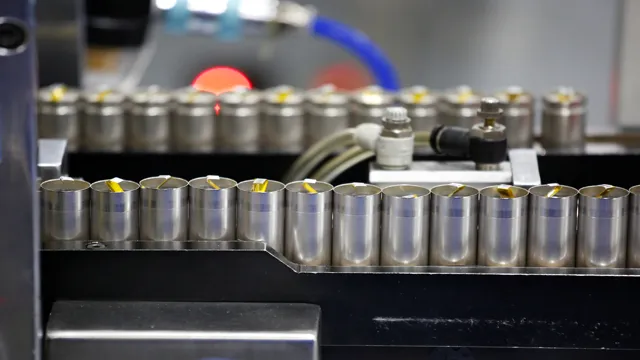
Cobalt’s Impact on Battery Performance and Longevity
Cobalt is a crucial element in the production of electric car batteries, as it helps to improve their performance and longevity. These batteries have to be able to store large amounts of energy and release it in a controlled manner, and cobalt plays a critical role in this process. Despite its importance, cobalt is a relatively scarce and expensive material.
As a result, manufacturers are constantly looking for ways to reduce their reliance on it. However, increasing demand for electric cars means that it is likely to remain a key component of battery technology for the foreseeable future. There is ongoing research to find alternative materials that can provide the same level of performance without the high cost and environmental impact associated with cobalt production.
Nevertheless, as it stands currently, cobalt remains an essential ingredient in the creation of electric car batteries.
Cobalt Sourcing and Sustainability
If you’re wondering whether electric car batteries contain cobalt, the answer is yes. Cobalt is a critical element in the production of lithium-ion batteries, which are commonly used in electric vehicles. In fact, cobalt makes up a substantial part of the battery’s cathode material, which helps store and release electrical energy.
However, cobalt sourcing has come under scrutiny due to its potential human rights abuses and environmental impacts. Most of the world’s cobalt supply comes from the Democratic Republic of Congo, where labor rights violations and child labor are prevalent. As a result, automakers and battery manufacturers are under increasing pressure to ensure that their cobalt is ethically sourced and that they have a secure, sustainable supply chain.
Battery manufacturers are already working on reducing the amount of cobalt used in their batteries, while others are exploring alternatives such as nickel and manganese. Nevertheless, until a viable substitute for cobalt is found, it remains a key element in electric vehicle batteries that requires responsible sourcing.
The Challenge of Ethical and Sustainable Cobalt Mining
Cobalt sourcing and sustainability are essential topics in today’s world. Cobalt, an essential component in rechargeable batteries, is mainly sourced from mines in the Democratic Republic of Congo (DRC). These mines have been linked to unethical practices such as child labor and dangerous working conditions.
Therefore, the challenge is how to ethically and sustainably source cobalt to cater to the growing demand for lithium-ion batteries powering electric vehicles and other electronic devices. Sustainability in cobalt mining involves minimizing the negative environmental impacts of mining activities through responsible mining practices. Mining companies can do this by using efficient water management systems, reducing carbon emissions and reusing mine tailings to pave roads.
Additionally, human rights organizations are pushing for increased transparency and accountability in cobalt mining to improve worker safety and eliminate exploitation. Further, stakeholders in the cobalt supply chain have a role to play in ensuring sustainability and ethical practices. Manufacturers of electric vehicles should demand transparency from their suppliers regarding the origin of cobalt, and they should work towards using recycled cobalt.
Consumers can also make ethical choices by buying products from companies that practice responsible sourcing of cobalt and avoiding those associated with unethical practices. In conclusion, cobalt sourcing and sustainability are crucial issues that need to be addressed, and all stakeholders must play their role. By working together, we can ensure that we meet the growing demand for cobalt in a way that is both ethical and sustainable.
The Push for Alternative Battery Chemistry
With the growing demand for electric vehicles and other devices powered by rechargeable batteries, the push for alternative battery chemistry has become more apparent. One of the key concerns in this regard is the sourcing and sustainability of cobalt, a metal commonly used in lithium-ion batteries. Cobalt mining has been associated with human rights abuses, environmental destruction, and child labor in some areas of the world, raising ethical concerns for companies that rely on this material.
As a result, there is increasing interest in developing new battery chemistries that require less or no cobalt. The goal is to find alternatives that are not only more sustainable but also provide better performance and longer lifetimes for batteries. While this transition will take time, it is an essential step towards a more environmentally friendly and socially responsible future.
The Future of Cobalt in Electric Car Batteries
Cobalt sourcing and sustainability are critical factors to consider when discussing the future of electric car batteries. While cobalt is a key element in lithium-ion batteries, its mining process has come under scrutiny for its unethical and unsustainable practices. The current supply chain is heavily reliant on the Democratic Republic of Congo, where child labor and human rights violations are prevalent in the cobalt industry.
As electric car production continues to accelerate, the demand for cobalt is expected to rise significantly, leading to further environmental and social impacts. However, manufacturers are already seeking alternatives to cobalt to reduce their reliance on the mineral and improve the sustainability of their supply chains. For example, electric vehicle giant Tesla has developed a cobalt-free battery that uses nickel and manganese instead.
The transition to more sustainable cobalt sourcing and alternatives could play a significant role in reducing the environmental and ethical impacts of electric vehicle production.
Are All Electric Car Batteries Created Equal?
Electric car batteries come in all shapes and sizes, but they are not all created equal. One important factor that can greatly impact a battery’s performance and pricing is the materials used in its construction. Specifically, cobalt is a component commonly found in electric car batteries, as it is an important element for making the cathode of lithium-ion batteries.
However, cobalt is also a scarce resource, and its mining can raise human rights and environmental concerns. Today, some car manufacturers are trying to reduce or eliminate the use of cobalt in their batteries, opting for alternative materials, such as nickel and manganese. They claim that these materials can provide similar or better performance without the ethical issues associated with cobalt mining.
However, these alternatives are not without drawbacks, and they can also raise concerns about safety, stability, and costs. In the end, the choice of materials for an electric car battery depends on a variety of factors, including its intended use, performance expectations, environmental impact, and cost. As a consumer, you should do your research and compare the features of different vehicle models and battery types to find the best fit for your needs and preferences.
Whether you choose a battery with cobalt or not, your decision can have a significant impact on the future of electric cars and the planet.
Different Electric Car Battery Types and Their Cobalt Content
When it comes to electric car batteries, it’s easy to assume that they are all the same, but that’s not necessarily true. Electric car batteries come in different types, each with its own set of advantages and disadvantages. The most common types of electric car batteries are Lithium-ion, Nickel-metal hydride, and Lead-acid.
While Lithium-ion batteries are the most popular due to their high energy density and longer lifespan, they also come with some downsides. One such downside is their high cobalt content, which results in environmental concerns due to the unethical mining practices associated with this mineral. On the other hand, Nickel-metal hydride batteries have a lower cobalt content and are more environmentally friendly, but they have a lower energy density and a shorter lifespan.
Lead-acid batteries, the oldest and heaviest types of batteries, have the lowest energy density and are the least environmentally friendly. The battery type used in an electric car can impact its performance, lifespan, and environmental footprint, so it’s essential to do your research before making a purchase.
The Trend Towards Cobalt-Free Batteries
As the world becomes more aware of the environmental impact of our actions, we must consider the materials used in creating electric vehicle batteries. While many car manufacturers have been using cobalt in their batteries, there is a trend towards cobalt-free batteries due to concerns about unethical sourcing and the negative impact of mining on the environment. It’s important to note, however, that not all electric car batteries are created equal.
Some companies are using alternative materials like nickel and manganese instead of cobalt, while others are still relying on problematic sources of materials. As a consumer, it’s vital to do your research and make informed decisions when purchasing an electric vehicle. By choosing eco-friendly and ethically sourced batteries, we can help create a more sustainable future for our planet.
Conclusion: What You Need to Know About Cobalt and Electric Car Batteries
Well, it turns out that just like how every good drama needs a villain, every electric car battery needs a little bit of cobalt. It may play a small role, but it’s an important one in ensuring the battery’s durability and overall performance. So while we may not be able to completely eliminate the use of cobalt in electric vehicles just yet, it’s exciting to see advancements and alternatives being explored to create a cleaner and more sustainable future for us all.
“
FAQs
Why is cobalt used in electric car batteries?
Cobalt is used in electric car batteries because it enhances the battery’s performance and extends its lifespan.
Are all electric car batteries made with cobalt?
No, not all electric car batteries contain cobalt. Some manufacturers use alternative materials, such as nickel, manganese, and aluminum.
Is cobalt mining for electric car batteries ethical?
Some concerns have been raised about the ethical issues surrounding cobalt mining, such as child labor and poor working conditions. However, efforts are underway to address these issues and create a more responsible supply chain.
Can electric car batteries be recycled to reuse cobalt?
Yes, electric car batteries can be recycled to extract and reuse valuable materials such as cobalt. This helps reduce waste and environmental impact.
